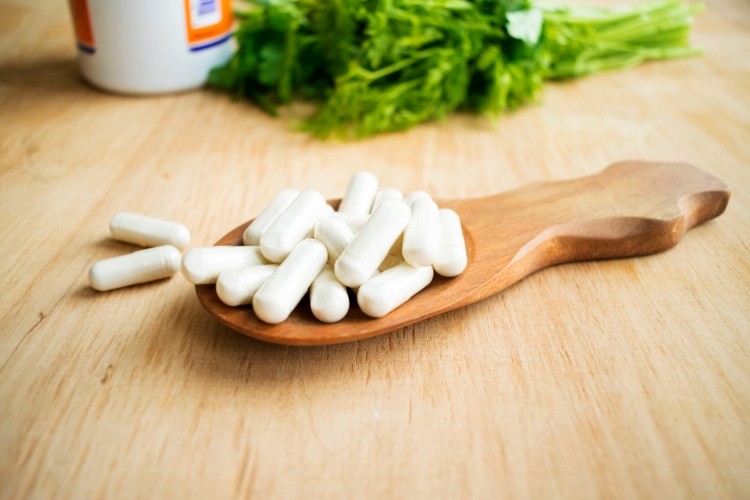Pilot study suggests vitamin K2 supplement surpasses diet in ability to reduce deficiency

The study from the University of Copenhagen, published in the 'International Journal of Nephrology and Renovascular Disease', is the first of its kind to compare the effect of vitamin K supplementation with diet alone.
The authors conclude that a daily MK-7 supplement for six weeks lowered measures of deficiency significantly, while a vitamin K rich diet was not able to induce any significant effect.
“This randomized, crossover study may have been small, but the findings suggest that diet alone is not enough to correct vitamin K levels in individuals with chronic kidney disease,” comments Ditte Hansen, Associate Professor and Specialist in Nephrology at the University of Copenhagen.
“The pilot study provides promising insights for future developments in the vitamin K space, and suggests that for those who are susceptible to inadequate levels of vitamin K, supplementation may be of importance.”
Kappa Bioscience supplied its vitamin K2 MK-7 solution (K2Vital Delta) to be used as the supplement tested.
Lena Leder, Manager Science and Content at Kappa Bioscience, adds: “While we generally advise a healthy diet first and foremost, diet alone may not be enough to help individuals who are susceptible to vitamin K deficiency achieve a healthy vitamin K status. We believe this pilot study highlights the potential of addressing the growing global vitamin K gap through supplementation and we’re excited that the participants of this study remarked that they found it easier to take tablets rather than altering their diet.”
Vitamin K2
Vitamin K is a fat-soluble vitamin that plays a key role in blood clotting, cardiovascular and bone health via activation of two important proteins, respectively - matrix Gla protein (MGP) and osteocalcin (OC).
Insufficient levels of vitamin K can lead to an increased risk of bone fractures and vascular calcifications, which is a risk factor for cardiovascular disease.
Dephosporylated-undercarboxylated MGP (dp-ucMGP) and undercarboxylated OC (ucOC) can be used as an indirect measure of vitamin K deficiency. Total MGP can also be used as an indicator of vitamin K status and includes the different isoforms of MGP (carboxylated, undercarboxylated, phosphorylated, and dephosphorylated).
The study
This study was a prospective randomized crossover intervention trial with two arms: 6 weeks of daily 360 µg MK-7 supplement produced and provided by Kappa Bioscience and six weeks of a vitamin K rich diet with a three-week washout period in between.
Patients included were ≥18 years old and in chronic hemodialysis treatment (≥3 months). Exclusion criteria were warfarin treatment, malabsorptive disease, and intake of vitamin K supplements. Blood samples were obtained at baseline and after six weeks for both interventions.
In the MK-7 intervention group, the participants received a daily tablet of 360 μg MK-7. Patients were instructed to take the tablet together with foods high in fat to ensure optimal absorption.
In the vitamin K rich diet arm, participants were instructed to increase consumption of foods containing mostly phylloquinone (vitamin K1) and some menaquinones (vitamin K2). The focus was on boiled vegetables, oils, cheese, and meat high in fat. The recommendations were individually modified with a dietician to consider their dietary restrictions. The researchers advised that boiling vegetables such as broccoli for a longer period is a possible source of phylloquinone for patients on dialysis, respecting the potassium restrictions, as this reduces potassium content.
The participants filled out a questionnaire regarding the degree of inconvenience of the two interventions. They were asked after each intervention to assess whether it had been easy, slightly difficult, difficult, very difficult, or so difficult that they could not follow the protocol completely. No food frequency questionnaire was applied.
Plasma concentrations of dephosphorylated undercarboxylated MGP, undercarboxylated OC and total MGP were measured pre- and post-intervention to determine vitamin K status.
After 6 weeks of diet intervention there was no significant change in dp-ucMGP (p=1.00), total MGP (p=0.26), or ucOC (p=0.77). After 6 weeks of MK-7 supplementation there was no significant change in total MGP (p=0.24), but there was a significant decrease in dp-ucMGP (p=<0.01) and ucOC (p=<0.01). There was no difference in the changes of dp-ucMGP (p=0.14) or tMGP (p=0.68) between the interventions, but there was a greater decrease in ucOC (p=0.02) during the MK-7 period compared to the dietary period
Participants of the trial noted that taking the supplement was easier than altering their diets, with 40% of participants rating the dietary intervention as difficult or very difficult, compared to 0% for the vitamin K2 MK-7 intervention period.
Future research
The authors note that limitations of the study include the small sample size and lack of assessment of the exact amount of vitamin K intake during the dietary intervention, as well as the lack of untreated group, however the cross-over design eliminated interindividual variation as the participants were their own controls.
They add that the lacking effect of the diet intervention could be due to preferences. The report states: "A dislike towards strongly boiled vegetables is common. There are probably many gastronomic possibilities for a better compliance to longer cooking times, although this potentially could cause new problems with the content of water-soluble vitamins.
"MK-7 supplementation was chosen due to the longer half-life and increased bioavailability compared to phylloquinone. The results may have differed if K1 supplementation had been provided instead of MK-7...
"In a future study precise diet registration should be made before and during such intervention. Furthermore, circulating levels of the different vitamin K forms should be measured throughout to determine if participants actually increase their intake of vitamin K and to confirm that the MK-7 supplement is consumed."





